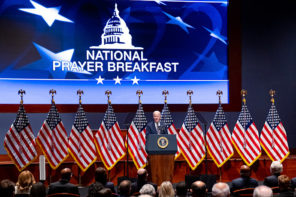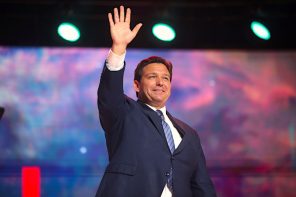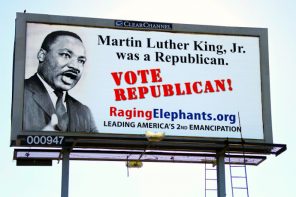Jeff Sharlet, The Family: The Secret Fundamentalism at the Heart of American Power (Harper, 2008).
Like the emperor’s new clothes, power is invisible to those who don’t happen to know about it. One could, as I did, spend eighteen years growing up less than a mile away from one of the great centers of theocratic power in the United States without knowing it was there. Tucked away in a quiet suburban neighborhood (as begin so many horror stories), its global influence can’t be seen from the street. I’ve been there and looked.
As Jeff Sharlet tells it in The Family: The Secret Fundamentalism at the Heart of American Power, that cluster of houses is home to a national horror story. But terrifying as it may be, between its secret conspiracies and Nazi connections, Sharlet ensures that above all it is fascinating. Through the lens of a loose and invisible organization, he sets out to unravel the whole knot of American political fundamentalism.
Sharlet, who has since become one of the best journalists covering American religion today (and a columnist for Religion Dispatches), got a remarkable scoop some years back. An acquaintance invited him into Ivanwald, the community in Arlington, Virginia, that exposed him to a network of which few outsiders are aware. He calls it “The Family,” though it goes by several names; some incorporated, others not.
Beginning as a praying, union-busting network of corporate bosses during the Great Depression, The Family rose to influence quickly in America’s postwar struggle against godless communism. In Washington, it has hosted the National Prayer Breakfast since 1953, a pious hob-nobbing opportunity for the powerful. Abroad, The Family’s representatives have served as a shadow diplomatic corps, facilitating relationships between their Washington friends and foreign allies, who usually happen to be brutal dictators.
Despite lacking so much as a Web site, the group is an indisputable presence on the Washington scene. It helped to broker the not-necessarily-intuitive alliance between free-market economics and conservative religion that rolled back the New Deal and built a Republican majority. A handful of Congressmen from both parties live in a townhouse that The Family owns. Born-again Watergate crook Chuck Colson is tried-and-true Family. Hillary Clinton has called Doug Coe, who has led the organization since 1966, “a genuinely loving spiritual mentor and guide to anyone, regardless of party of faith, who wants to deepen his or her relationship with God.” Pro-Obama blogger Oliver Willis was sure to juxtapose this remark with some of the nice things Sharlet records Coe saying about the mafia, Lenin, and, yes, Hitler. They were great revolutionaries, great operators; only their goals were mistaken.
The Family’s self-proclaimed creed is as appealing as it is hollow: “Jesus plus nothing.” Even Bible reading and charity work can get in the way. Members aren’t encouraged to go to church, since most churches are dens of lukewarmness and compromise. Instead, submit to authority while seeking to gain it for yourself. Do what is necessary, for sins are forgotten under the the Blood of Jesus.
If the Jesus of this formula means anything, according to Sharlet, it is power. “Power belongs to God,” sings Psalm 62, and for The Family, so do people who wield it. Take King David, who God blessed despite his ruinous sins; dominion is more important than good behavior. Jesus represents manly, efficient, and powerful power. And just as Jesus showed with his disciples, leaders have no responsibility to be transparent. So much for the meek.
Doing what their idea of Jesus would do, The Family becomes tough to distinguish from an ordinary old boys’ network. They know what’s good when they see it. Since their interests are alike, there isn’t much need for debate. They look out for their own and have little need for formal organization. The more secretive they are, the better it works. So why bother with Jesus at all?
Sharlet believes the answer is a matter of history, and his story gets a whole lot bigger. The roots of this eerie ideology, for him, go back to the early American revivalists like Jonathan Edwards and Charles Finney. They preached a Jesus of the frontier: muscular, self-reliant, and terse with words. Then comes a sequence of prosperity preachers and cowboy evangelists who have never ceased to capture American hearts. The master narrative arrives all the way at the door of New Life Church in Colorado Springs, the megachurch that Sharlet infiltrated for a gripping 2005 feature in Harper’s . Throughout, he suggests, the power principle is at the core of American Protestant fundamentalism, and The Family is its purest manifestation.
So we don’t have to, Sharlet catches himself in the act: “We keep trying to explain away American fundamentalism.” Barack Obama’s notorious suggestion that in their misery, small-towners “cling to guns or religion” certainly belongs to this old Marxist habit. But while Sharlet stops himself short of explaining away, he never quite abandons the “we” who are not the “them” of power-breathing fundamentalism. Everything associated with the name, from the pious side of McCarthyism to the War in Iraq, is their fault. Somehow, even in their midst, “we” are something else.
And here lurks the danger in a master narrative: it promises a means of distinction between those who belong to it and those who don’t, as if the spiritual sons and daughters of Jonathan Edwards have inherited a special chamber in their hearts. But the truth is, especially in a country like this one, the narratives intertwine and the grey areas are plentiful. In his willingness to admire the atheist Lenin, The Family’s Doug Coe knows this well enough. The prosperity gospel is as much a secular self-help phenomenon as a Jesus movement, and The Family is hardly the first club to fetishize power. Liberals do it too, and claim their own God’s favor in the process. If we merely point fingers at Jonathan Edwards, we’ll have another thing coming when we see how little burning every copy of his will do. The Family didn’t learn union-busting from the eighteenth-century preacher, but from worldly industrialists. Thankfully Sharlet is equally at home speaking of both bosses and divines.
Still, there is a special something about power-mongers and secret societies. Maybe the word is “mystical.” It felt possible for me to explain away the Bush Doctrine as oil and realpolitik, or even class resentment, until I spent a day at a “prophecy conference” in a packed church in affluent Santa Barbara, California. Don’t worry about human suffering in the Middle East, the pastors taught, worry about God’s will. People nodded and took notes, and in that room everything I thought I knew about the world felt worthless before the vision of mystical order. Talk like this can’t be used: speak it, even hear it, and it uses you. You become it.
Something similar might be said for pronouns. As long as we remain simply we, they will stay them, not cowering at being explained away. At his best, Jeff Sharlet reveals the power and presence of American fundamentalism where it isn’t often noticed. He places it in our common story, where it should be—among us, our neighbors, and ourselves. Yet at times he writes as if, after all that, we can treat it simply as an enemy.
Look for Religion Dispatches’ upcoming roundtable with Jeff Sharlet, Randall Balmer, Diane Winston, Anthea Butler, and the RD editorial staff.




